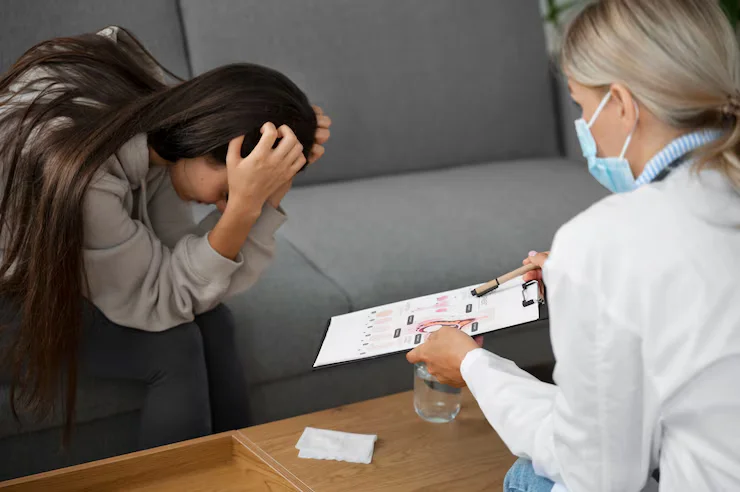Many people suffer from OCD, which can cause significant disruptions to their daily lives and general health. It is characterized by unwanted thoughts and compulsive repetitive actions that may be hard to control. Knowing what treatments are available can help the affected start taking back control of their life. In this guide, we cover different techniques for alleviating OCD and for helping people who are suffering from OCD live more fulfilling lives.
Understanding OCD
To understand how to treat it, you first need to understand OCD. It is a mental health disorder characterized by unwanted thoughts, urges, or images that can lead to anxiety. This anxiety can be reduced by doing any number of repetitive, compulsive behaviors. These compulsions may relieve the anxiety for a short time, but can also create an addictive loop that can be very hard to break out of. Thus, OCD treatment in La Jolla or near your locality becomes necessary for those seeking help to manage their behaviors and thoughts.
Getting help through Cognitive Behavioral Therapy (CBT)
Another option is something called cognitive behavioral therapy, which is a standard treatment for OCD itself. This type of therapy targets unhealthy thought patterns and helps you change them. Cognitive behavioral therapy is effective because it allows people to see how their thought process relates to the way they feel and to the way they act. People learn to question their irrational beliefs and develop more effective coping skills in more formal sessions.
Exposure and Response Prevention (ERP)
Exposure and Response Prevention (ERP) is a specific part of cognitive-behavioral therapy (CBT). ERP involves gradual exposure to feared situations or thoughts while refraining from engaging in compulsive behaviors. With repeated use, this process alleviates fear and diminishes the compulsion to act. Although it needs time and effort on the part of the patient, ERP has been effective in harnessing OCD symptoms.
Medication Options
Medication, for many, is a huge help in controlling OCD. To mitigate symptoms, selective serotonin reuptake inhibitors (SSRIs) are often prescribed. These medications help restore the balance of brain chemicals that can relieve the obsessive thoughts and compulsions. Collaboration with a healthcare provider to identify the proper medications and dosages is essential.
Mindfulness and Relaxation Techniques
In addition to conventional treatments, mindfulness and relaxation techniques may help. Meditation, deep breathing, and yoga are some practices that help people be more in the moment and handle stress. These techniques induce a state of relaxation and can help decrease rumination regarding obsessions.
Communal Resources and Support Groups
Meeting others who truly get what it means to have OCD and the challenges that come with it can be so helpful. Seeking hope from support groups helps provide a safe place to share and learn from one another. Community resources, whether virtual or face-to-face, give a sense of belonging and guidance in your recovery.
Family and Friends’ Role
Having the support of family members and friends is vital in the treatment process. They can provide encouragement, understanding, and patience. You can also educate them about OCD, which makes it easier for them to be understanding and considerate.
Lifestyle Adjustments
Minor lifestyle adjustments can have a noticeable effect on handling OCD. Regular exercise, a healthy diet, and good sleep will improve mental health. Limiting caffeine and alcohol also helps stabilize emotions. Having a routine instills structure and predictability, which in turn can reduce anxiety.
Guidance from Experts and Professionals
Luckily, the first step is to consult with a mental health professional for better management of OCD. Therapists, psychologists, and psychiatrists offer us knowledge, guidance, and assistance based on each person’s needs. Regular sessions help maintain continuous support and adjust treatment plans when necessary.
Always Staying Hopeful
Overcoming OCD takes time, effort, and a strong commitment. It may not always be a smooth road; it may involve a zig-zag route and several failures in between. Adhering to the treatment regimen and being informed about seeking necessary help are essential steps. Recovery is not an instant change; it takes time, so enjoying small wins throughout the process is vital.
Wrapping Up
OCD treatment consists of several methods that enable people to take back their lives. With knowledge of the disorder and research of the available avenues, the ideal path to recovery could be found. With appropriate tools, determination, and support (through therapy, medication, or from loved ones), it is entirely possible to manage OCD. By incorporating these techniques, you can lead a more balanced and meaningful life without succumbing to obsessive-compulsive tendencies.







